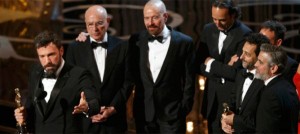 A day after�Argo�won the Oscar for best picture, two of the former U.S. hostages in Iran said the film, which deals with the 1979-81 crisis, should spur efforts to resolve differences diplomatically, not just underline mutual grievances.
A day after�Argo�won the Oscar for best picture, two of the former U.S. hostages in Iran said the film, which deals with the 1979-81 crisis, should spur efforts to resolve differences diplomatically, not just underline mutual grievances.Appearing on Capitol Hill Monday [Feb. 25] on the eve of new talks in Kazakhstan between Iran and the five permanent members of the U.N. Security Council plus Germany, Bruce Laingen and John Limbert called for deeper engagement to deal with Iran�s nuclear program and other contentious issues.
�The problem with these contacts is that they are desultory, not sustained,� said Laingen, describing the brief and intermittent meetings Iran and the P5+1 have held since last year in Istanbul, Baghdad, Moscow and now Almaty.
Laingen, who was the senior U.S. diplomat in Iran on Nov. 4, 1979, when students overran the U.S. Embassy to protest U.S. admission of the deposed shah for medical treatment, said he could not have imagined that American representation in Iran would still be lacking three decades later.
�We should be there representing the United States of America,� Laingen said. �We have zilch and that�s not a very good basis on which to have any kind of relationship.�
Limbert, a scholar of Iran who served as deputy assistant secretary of state for Iran in the first Obama administration, said he worried that the Almaty talks would not produce progress because �both sides have painted themselves into rhetorical corners� and the incentives the U.S. has offered for agreement �the Iranians dismiss as insignificant.�
A U.S. diplomat told reporters covering the talks�that the P5+1 intends to �put a modified proposal on the table�that both takes into account changes in Iran�s [nuclear] program, and is responsive to Iran�s desire for the P5+1 to recognize Iran�s needs.� The diplomat called the offer �real, serious, and substantive,� hinting that it contained more than the limited rollback of sanctions on trade in precious metals that has been leaked to the press in advance of the talks.
Iran has increased its stockpile of enriched uranium and made other advances�in recent months, according to the International Atomic Energy Agency, that lend new urgency to negotiations.
Limbert said it might be easier to make progress on other issues than the nuclear question and that Iran might be more willing to meet bilaterally with the United States away from the glare of the international media.
He also said he worried that the Iranian government would�add the Academy Award for�Argo�to the litany of complaints�Iran has about the United States.
They include the 1953 CIA coup that restored the shah to power, supporting Iraq during the 1980-88 Iran-Iraq war, shooting down an Iranian passenger plane in 1988, piling economic sanctions on Iran over its nuclear program and taking a once-violent Iranian opposition group, the Mujaheddin-e Khalq, off the State Department�s list of terrorist organizations.
��You gave an award to�Argo�which paints us in a bad way,�� will be added to this list of grievances, Limbert said.
In fact, the picture is more nuanced and depicts at least one Iranian who enables a CIA officer, Tony Mendez (played by director Ben Affleck), masquerading as a Hollywood B-movie producer, to free six Americans who managed to escape from the U.S. Embassy and were sheltered by Canadian diplomats.
The introduction to the movie, while factually flawed � as was the movie itself � also tries to explain Iranian anger at the United States for the 1953 coup and U.S. support for the shah, who repressed domestic opposition forces, at times brutally.
However, Iranian media has focused on the movie�s overall depiction of the hostage crisis as reinforcing negative stereotypes about Iran and its people, Limbert said.
While urging diplomacy with Iran, Limbert called the hostage crisis �ugly, outrageous and shameful.� He said the United States should not seek to send diplomats back to Iran �until somehow the Iranian government comes to terms with what was shown in�Argo.�
Limbert told�Al-Monitor�that he wasn�t looking for an apology per se but an Iranian government statement that seizing and holding diplomats hostage for 444 days �was a really stupid thing.� Limbert referred to an Iranian expression that translates literally as �to eat sugar� but means �to eat crow.�
Iranian officials tend to downplay the whole affair and note that the hostages were eventually freed in a deal mediated by Algeria.
The ex-hostages are not the only ones to express hope that the movie will do more than dredge up negative American feelings about the Islamic Republic of Iran.
In accepting the Oscar for best adapted screenplay,�Argo�screenwriter Chris Terrio said Sunday night that he wanted to dedicate the award to Tony Mendez, the Canadian diplomats who gave the Americans refuge and to �people all over the world in the U.S., in Canada, in Iran, who use creativity and intelligence to solve problems non-violently.�
By Al-Monitor
The Iran Project is not responsible for the content of quoted articles.










